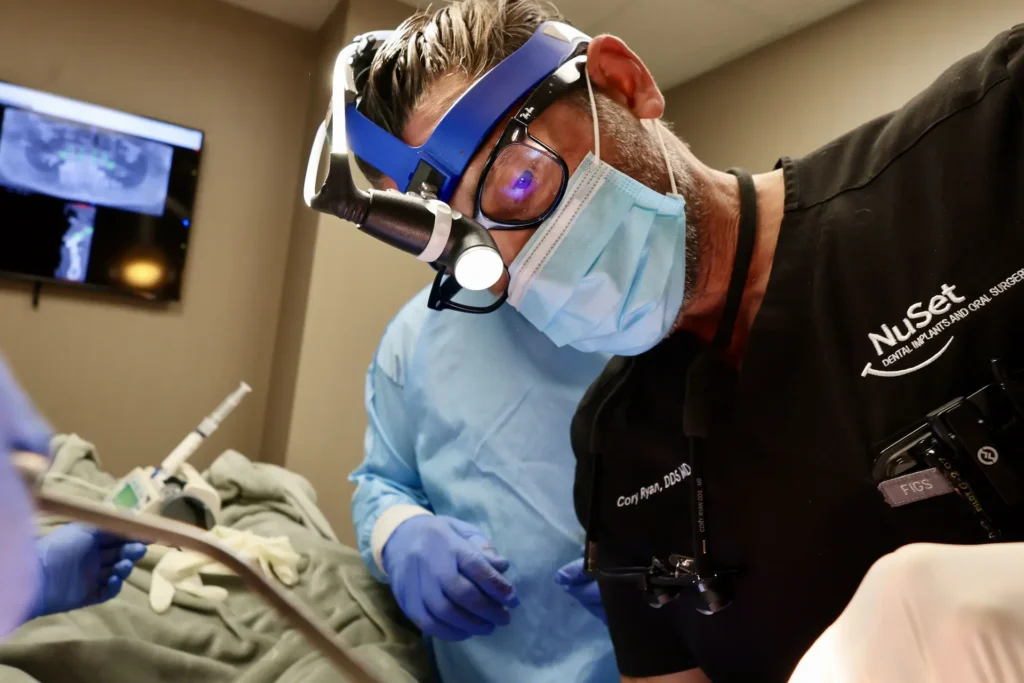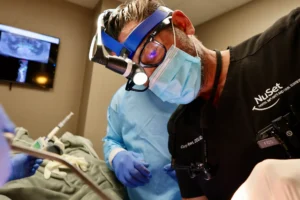If you’re thinking about getting dental implants, you’re not alone. About 178 million Americans are missing at least one tooth, and 40 million have lost all their teeth. But one question many people ask is: Do gums grow over dental implants?
Your gums are just as important as the implant itself. They help protect it and keep it stable. After surgery, your gums heal and form a seal around the implant- but they do not grow over the implant.
Knowing what to expect after getting an implant can help you take better care of your gums. Let’s discuss how gums heal, what to watch for, and how to keep your implant healthy.
Key Takeaways
- Gums do not grow over dental implants.
- Good oral hygiene is key—brush gently, use a waterpik instead of regular floss, and rinse with non-alcoholic mouthwash.
- Smoking weakens gums and increases the risk of implant failure.
- A healthy diet with vitamin C, calcium, and plenty of water helps keep gums strong.
- Regular dental checkups prevent serious gum problems and keep implants secure.
- If you notice swelling, pain, or gum changes, see a dentist immediately to protect your implant.
Your Gums After Dental Implant Placement
Your gums protect your teeth and implants by creating a barrier that keeps bacteria out and supports your implant. The gums form a tight seal around the implant which helps keep the implant stable and prevents infection.
After surgery, your gums go through a healing process to create this seal and adjust to the implant.
The entire healing process takes about 3-6 months. But most of this healing is done ‘beneath the surface’, and your smile will still be as natural and normal as you dream of. While it’s normal for your gums to feel slightly sensitive within the first few weeks, our team will ensure you are kept as comfortable as possible throughout the process. Over time, the gums will shape themselves around the implant, creating a natural look.
Do Gums Grow Over Dental Implants?
Your gums heal and adjust after implant surgery, but they do not grow over implants. Instead, they form a protective seal around the implant which helps keep bacteria out and supports the implant.
In some cases, gum tissue may grow too much and partially cover the implant. This can happen if the healing cap or abutment is not placed correctly or if the gums react by overgrowing. If this happens, the team at NuSet Dental Implant Center will be able to advise the best course of action.
What If Gums Cover a Dental Implant?

Gums should not completely cover a dental implant. If they do, it can make it harder to attach the abutment and crown. It can also trap bacteria, causing the implant to be infected.
This can happen for a few reasons:
- Your dentist did not place a healing cap or abutment. Avoid this by visiting an implant specialist at NuSet.
- Your gums naturally overgrow as part of the healing process.
- There was a delay in placing the crown, allowing gum tissue to grow over.
If your gums cover the implant, your specialist will need to remove the excess tissue. This is a simple procedure and, if needed, they will place a healing cap to guide proper gum growth.
How to Prevent Gum Recession for Healthy Healing
When gums pull back, they expose the implant and make it easier for bacteria to build up. But the team at NuSet will ensure you know how to keep your gums healthy and strong:
Brush Gently but Thoroughly
Brushing too hard can wear down your gums. Use a soft-bristled toothbrush and brush in gentle, circular motions. Hold the brush at a 45-degree angle to clean along the gumline without irritating the tissue. Avoid stiff brushes, as they can push your gums back over time.
Use a Water Flosser
Regular floss can damage the tissue around your implant, increasing the risk of gum recession. Instead, use a water flosser. A water flosser uses a gentle stream of water to remove food and plaque without pulling on your gums. Focus on cleaning around the implant and under the gumline to keep bacteria away.
Rinse with a Non-Alcoholic Mouthwash
Choose a non-alcoholic antibacterial mouthwash to keep bacteria under control. If you prefer a natural option, rinse with warm salt water to soothe your gums and reduce inflammation.
Stop Smoking (or Cut Back as Much as Possible)
Smoking slows down healing and weakens your gums. It reduces blood flow to the tissue, making it harder for your gums to stay strong. If quitting feels overwhelming, start by cutting back gradually. Even reducing your intake can improve your gum health.
Eat Foods That Strengthen Gums
Your diet plays a big role in keeping your gums healthy. Eat foods rich in vitamin C, like oranges, bell peppers, and strawberries. These help your gums stay firm and heal faster. Calcium and vitamin D, found in dairy products, leafy greens, and fish, help keep your jawbone strong.
Stay Hydrated
Drinking plenty of water washes away bacteria and keeps your gums from drying out. A dry mouth can lead to irritation and make it easier for plaque to build up. Sip water throughout the day, especially after meals.
Visit Your Dentist Regularly
Even if everything feels fine, your dentist can spot early signs of gum recession before it becomes serious. Routine cleanings and checkups help keep your gums and implants in the best shape possible. If your gums start to pull back, your dentist can suggest treatments to stop it from getting worse.
Healthy gums keep your dental implant secure. The better you care for them, the longer your implant will last. If you notice your gums receding, don’t wait—talk to your dentist and take action early.
When to See a Dentist for Gum Issues Around Implants
Your gums should feel comfortable and look healthy around your dental implant. If something feels off, don’t ignore it. Here are signs that you should see a dentist as soon as possible.
Extended Redness, Swelling, or Bleeding
If gums turn red, swollen, or bleed easily for some time after the implant surgery, you might have an infection. When this happens, contact your dentist immediately.
Pain or Discomfort
Mild discomfort is normal after implant surgery, but ongoing pain, tenderness, or throbbing is not. Pain around your implant could mean you have an infection, gum irritation, or pressure on the implant. The NuSet team can check for any issues and treat them before they get worse.
Gum Recession Around the Implant
If your gums start to pull back, exposing more of the implant, this is a warning sign. Gum recession can weaken the support around the implant, making it more vulnerable to infection or loosening. Your NuSet implant specialist can recommend treatments to protect the gums and keep the implant stable.
Bad Breath or a Bad Taste That Won’t Go Away
Chronic bad breath or a foul taste in your mouth could be a sign of infection. Bacteria can build up around the implant and cause irritation or deeper gum problems. If brushing and mouthwash don’t help, schedule a dental visit with NuSet.
Loose Implant or Movement
Your implant should never feel loose. If it moves, shifts, or feels different when you chew, see your implant specialist immediately.
Discharge Around the Implant
Discharge is a clear sign of infection. If you see white or yellow discharge coming from the gums near your implant, don’t wait. This could be a sign of an abscess, which needs urgent treatment to prevent further damage.
Trust NuSet Dental Implant and Oral Surgery to Keep Your Gums and Implants Healthy!
Your gums protect your dental implant, keep it stable, and help it last for years. But in the rare event that they start to overgrow, recede, or show signs of infection, your implant could be at risk.
At NuSet Dental Implants and Oral Surgery, we know how to prevent and treat gum issues before they become serious. With the right care, your implant can last a lifetime.
If you notice pain, swelling, or gum changes around your implant, don’t wait. Our expert team is here to help. We use the latest technology and techniques to protect your smile and keep your implants secure.
Schedule your appointment today, and let us take care of your gums and implants the right way!
Frequently Asked Questions
How long does it take for gums to grow over implants?
Gums do not completely grow over dental implants, but they do heal and form a protective seal around them.
What happens if gum grows over an implant?
In the event this happens, your dental implant specialist at NuSet can trim the excess gum tissue to ensure proper healing and implant function.
Do gums recede with dental implants?
Yes, gum recession can happen around implants, just like with natural teeth. Poor oral hygiene, aggressive brushing, smoking, or gum disease can cause gums to pull back, exposing the implant. Regular dental visits and proper care can help prevent this.
How do I know if my dental implant is healing correctly?
A healthy, healing implant should feel secure and pain-free after the initial recovery period. Mild swelling or tenderness is normal in the first few days. If you notice any unusual symptoms, contact your implant specialist immediately.
I can see my dental implant through my gum—what should I do?
If your implant is visible through the gum, it could be a sign of gum recession or improper healing. This exposes the implant to bacteria and can lead to complications. Schedule a dental visit right away so your dentist can assess the issue and recommend the best solution.





